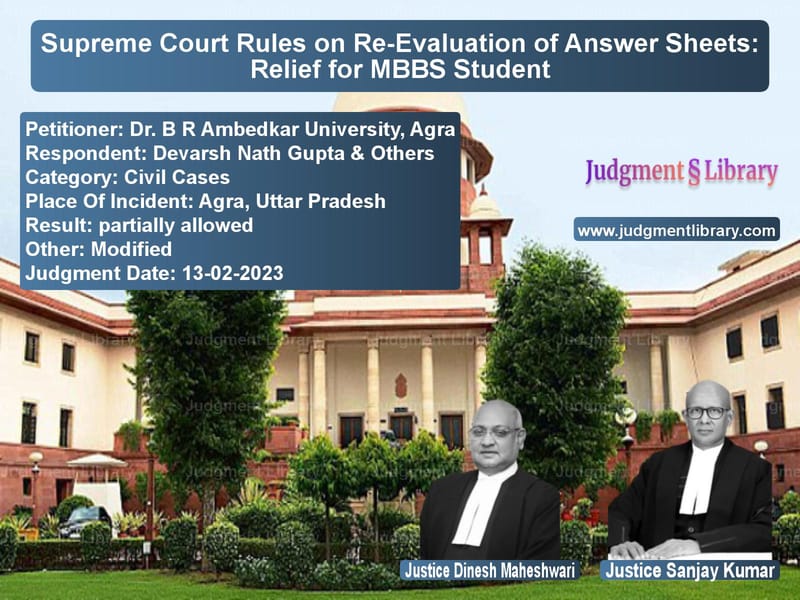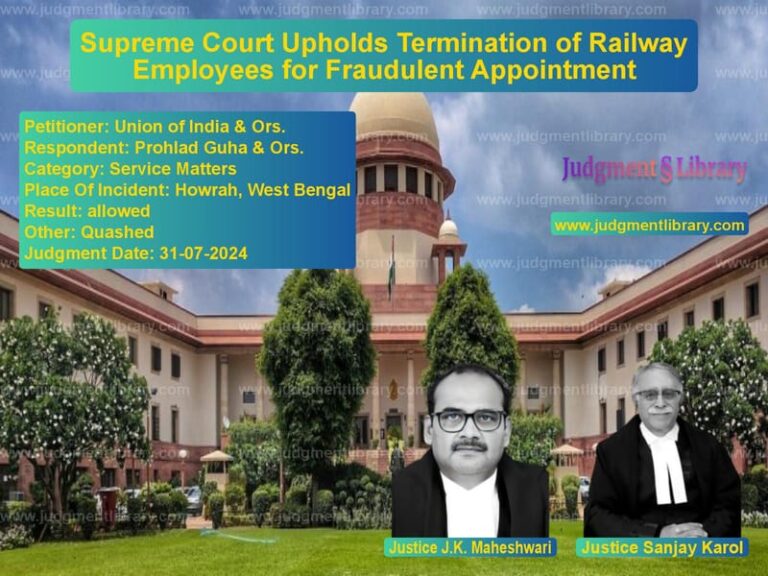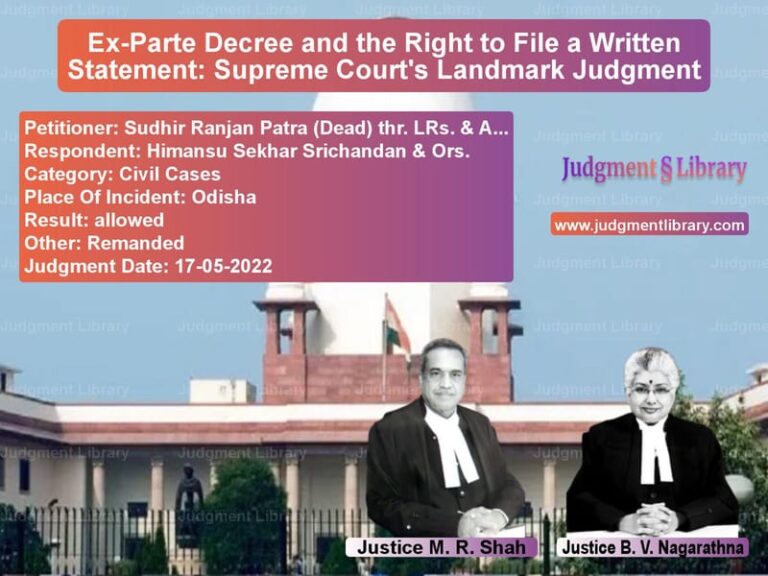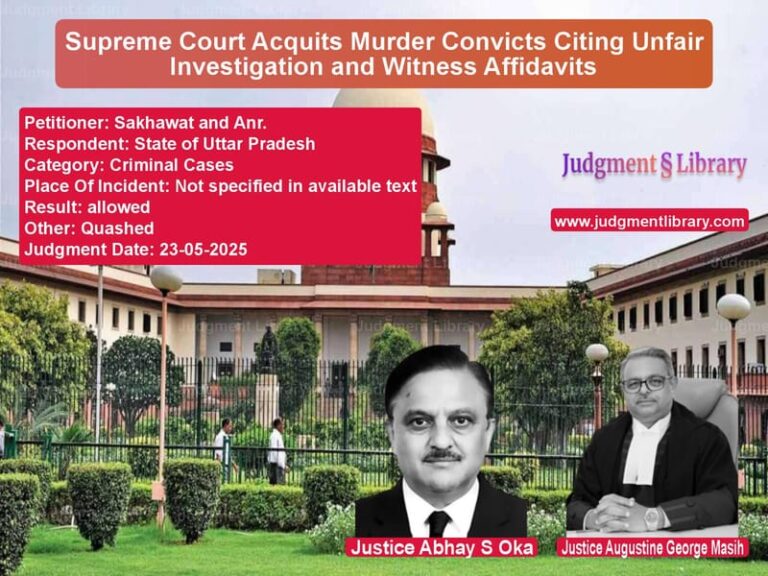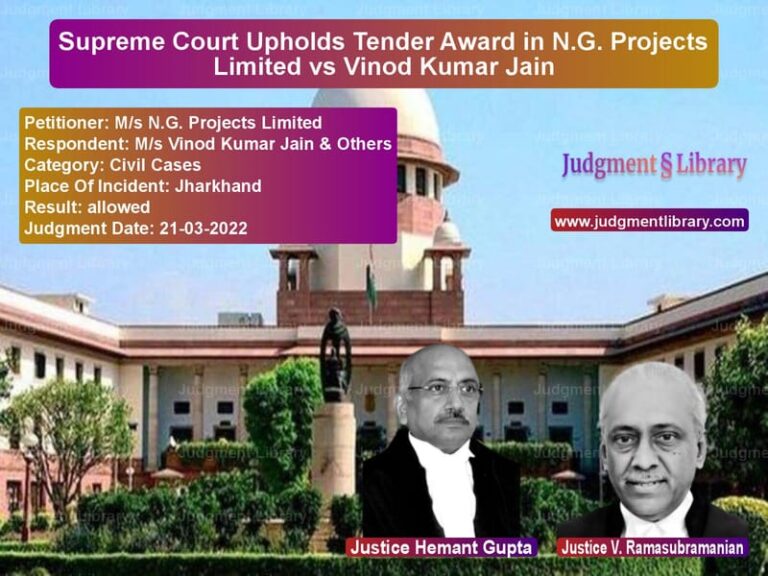Supreme Court Rules on Re-Evaluation of Answer Sheets: Relief for MBBS Student
The Supreme Court of India, in the case of Dr. B R Ambedkar University, Agra vs. Devarsh Nath Gupta & Others, ruled on a crucial matter regarding re-evaluation of answer sheets in university examinations. The case involved the denial of re-evaluation to a student due to the absence of such a provision in the university’s statute. The Court set aside certain directions issued by the Allahabad High Court but upheld the relief granted to the student in this specific case.
Background of the Case
The case arose when the respondent, Devarsh Nath Gupta, a student of M.B.B.S. at S.N. Medical College, Agra (affiliated with Dr. B R Ambedkar University), failed his first professional examination held in December 2018. While he had scored 344 marks out of 600, he was declared failed due to receiving only 6 marks in Paper-II of Physiology.
Upon receiving a copy of his answer sheet, the student found that his paper had not been properly evaluated. He applied for scrutiny and re-checking of his answer sheet. When the university failed to act on his request, he approached the Allahabad High Court, seeking a writ of mandamus for re-evaluation.
Arguments by the Petitioner (Dr. B R Ambedkar University, Agra)
- The university argued that its statute does not provide for re-evaluation of answer sheets, and courts should not interfere in academic policies.
- The petitioner contended that the High Court’s order effectively amended the university’s statute, which was impermissible.
- It was asserted that the evaluation process is subjective, and different examiners may award varying marks for the same answers.
- The university also pointed out that the original examiner had scored out certain answers and awarded zero marks, indicating that he had applied his judgment.
Arguments by the Respondent (Devarsh Nath Gupta)
- The student contended that his answer sheet was left unchecked in many places, proving that the evaluation was negligent.
- He argued that universities must ensure fairness in examination procedures and provide a remedy in cases of evident mistakes.
- The respondent emphasized that the High Court had not arbitrarily ordered re-evaluation but had taken this step only after finding serious discrepancies in the marking.
Allahabad High Court’s Ruling
The High Court, upon examining the answer sheet, found that the examiner had awarded marks without due consideration. It ordered the university to get the answer sheet evaluated by three independent examiners. Upon evaluation, they awarded 19, 20, and 21 marks, respectively, which were significantly higher than the original 6 marks.
The High Court directed the university to award the student the average of these marks and to correct his result accordingly. Additionally, it imposed a fine of Rs. 1 lakh on the university for negligence.
Further, the High Court directed the university to allow re-evaluation of answer sheets for any student who had appeared in the preceding three years, even if no such provision existed in the university’s regulations.
Supreme Court’s Analysis and Judgment
The Supreme Court reviewed the case and examined the legality of the High Court’s directions. The key findings were:
- Judicial Intervention in Academic Matters: The Court reiterated that courts should not interfere in academic decisions unless there is clear arbitrariness or injustice.
- Relief for the Respondent: Given the exceptional circumstances, the Court upheld the relief granted to the student.
- Legality of Re-Evaluation: The Court ruled that courts cannot mandate re-evaluation where no statutory provision exists for the same.
- Setting Aside the Broader Directives: The Court struck down the High Court’s direction to allow re-evaluation for all students of the past three years, ruling it as judicial overreach.
The Supreme Court stated:
“In a Court of law, when a particular litigation in reference to its subject matter is taken up for final decision, the decision ought to remain confined to the issues arising for determination in the matter. Even if an ancillary relief is considered appropriate, the same could be granted only in direct correlation with the facts and circumstances of the case and not beyond.”
Final Verdict
- The Supreme Court upheld the relief granted to the student but struck down the general directions issued by the High Court regarding re-evaluation for other students.
- The fine of Rs. 1 lakh imposed on the university was quashed.
- The ruling reaffirmed that re-evaluation cannot be mandated unless expressly provided for in the university’s statute.
This judgment balances the need to rectify clear errors in examination marking while preventing courts from encroaching upon academic regulations. It serves as an important precedent in education-related disputes.
Read also: https://judgmentlibrary.com/supreme-court-overrules-high-court-on-land-acquisition-lapse-in-delhi/
Petitioner Name: Dr. B R Ambedkar University, Agra.Respondent Name: Devarsh Nath Gupta & Others.Judgment By: Justice Dinesh Maheshwari, Justice Sanjay Kumar.Place Of Incident: Agra, Uttar Pradesh.Judgment Date: 13-02-2023.
Don’t miss out on the full details! Download the complete judgment in PDF format below and gain valuable insights instantly!
Download Judgment: dr.-b-r-ambedkar-uni-vs-devarsh-nath-gupta-&-supreme-court-of-india-judgment-dated-13-02-2023.pdf
Directly Download Judgment: Directly download this Judgment
See all petitions in Education Related Cases
See all petitions in Judgment by Dinesh Maheshwari
See all petitions in Judgment by Sanjay Kumar
See all petitions in partially allowed
See all petitions in Modified
See all petitions in supreme court of India judgments February 2023
See all petitions in 2023 judgments
See all posts in Civil Cases Category
See all allowed petitions in Civil Cases Category
See all Dismissed petitions in Civil Cases Category
See all partially allowed petitions in Civil Cases Category

